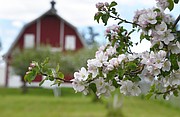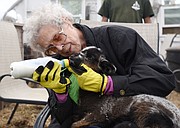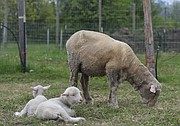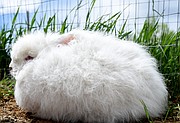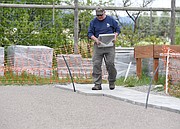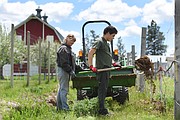Farm academy continues to grow at veterans home
Lynnette Hintze / Daily Inter Lake | Hagadone News Network | UPDATED 8 years, 8 months AGO
On the walking trail surrounding the Farming for the Future Academy’s garden and burgeoning barnyard, veterans routinely settle on park benches to watch the ducks, newborn lambs and other animals romping around the small farm. Sometimes they focus on the bees buzzing around nearby hives.
All of the benches often are filled if the weather is nice, Sherry Lewis-Peterson noted as she cradled one of the farm’s Angora rabbits in her arms. “They’ll sit there for hours.”
Many of the more able-bodied veterans have helped in the garden over the past couple of years, and once there are paved areas around the raised garden beds, veterans in wheelchairs and walkers also will be able to help out.
Lewis-Peterson is the force of nature behind the farm academy that operates on the campus of the Montana Veterans Home in Columbia Falls. Ideas still bubble up for her faster than they can be actualized, but she’s come a long way in the nearly five years since the idea for a farm-based school germinated.
The goal was to establish a working farm and school that features an educational program for children with autism and other learning disabilities. An outdoor classroom like the space provided at the veterans home provides a place for students to gain life skills and sensory experiences while they learn self-paced curriculum tailored to each child’s abilities.
In 2013 a partnership began with the Montana Veterans Home, when Administrator Joren Underdahl offered about an acre of unused land for a garden.
“Joren has been amazing,” Lewis-Peterson gushed. “He understands the need for more interaction” between the veterans and younger generations.
Farming for the Future Academy’s summer camps for children have been wildly popular, and resume June 12-13 with the first session called “Rhubarb Bird Bath.” The ratio of disabled and autistic children to those without disabilities is about 50-50, she said.
Other groups such as Flathead Care Farming use the academy’s facility to offer a therapeutic day-farming experience.
Developing the garden and farm has been a hugely collaborative effort with various other forces in the community, Lewis-Peterson said. Home Depot, for example, has pumped $40,000 worth of materials and labor into the farm facility, with unwavering support from Home Depot employee Katelyn Worth.
“Katelyn has been a strong advocate for volunteering,” Lewis-Peterson said. “This whole garden has been her baby.”
Two Navy SEALS currently are mending the garden’s irrigation lines.
Vadim “Little John” Derov, a local carpenter, provided modular pieces for the small barn-like huts on the property. “They were like puzzle pieces so autistic kids could help,” Lewis-Peterson noted.
Children at the very first summer camp built an outdoor stone oven, and college students decorated it with glass pieces shaped into a mosaic.
Local master gardeners prune the fruit trees.
Networking has been the name of the game.
“The camaraderie is beautiful,” Lewis-Peterson said.
She plans to start a preschool in the chapel building at the veterans home that also will have an intergenerational focus.
Underdahl said the lease for the building with the state has been drafted and just needs a start date before it’s completed. The veterans home uses the chapel building occasionally for training or anytime a larger facility is needed, but it’s not used much on an ongoing basis, he said.
“She has worked with our recreation director on how it would work to have the kids here,” Underdahl said.
Residents enjoy the school groups who visit, but having the day-to-day presence of children “where they’d be able to develop relationships” would be good for both generations, he added.
“It’s good for kids to have interaction with the elderly,” he said, and it’s also beneficial for the residents.
Lewis-Peterson jump-started the gardening end of the academy with grant funding that got her “Onions for Autism, Veggies for Vets” project off the ground. She recently got a grant from the Whitefish Community Foundation for the next phase, “Barnyards to Battlefields,” the farming operation that will give both children and veterans hands-on farm experiences.
Grant funding has been crucial in establishing Farming for the Future Academy. A $10,000 donation from BNSF Railway Co. enabled Lewis-Peterson to begin offering the free camp sessions in 2014.
The impetus for starting a farm academy was Lewis-Peterson and her husband Chris’ son, Hunter, who is 19 and is autistic. They struggled to advocate the best learning environment for their son within the public school system, and wound up home-schooling him.
Hunter has been an integral part of Farming for the Future. He handles much of the farm work during the winter months.
“Every parent with a child with special needs fears the day they’re no longer going to be here to provide for them, to keep them safe, that they’re going to have the ability to protect themselves and be part of a community,” Lewis-Peterson said in an earlier interview.
Operating an agriculture-based education program is right up her alley. She has a degree in psychology and elementary education and a master’s degree in curriculum and instruction, with specialized training in special education.
Lewis-Peterson incorporated gardening and farming into the home-based daycare and preschool she operated for more than 15 years. During the summer her preschoolers helped with the garden. In the winter the greenhouse at her home provided shelter for the family’s chickens and rabbits.
Time and money are the biggest obstacles in building the academy to the level Lewis-Peterson envisions. She would love to have a self-sustaining, year-round program that pairs para-educators one-on-one with disabled and autistic children.
And she’s undaunted in her pursuit. If only there were more hours in the day.
Features editor Lynnette Hintze may be reached at 758-4421 or [email protected].
ARTICLES BY LYNNETTE HINTZE / DAILY INTER LAKE
No headline
Food pantry founders turning former Swan Valley boot camp into veterans center
With Allen and Linda Erickson, where there’s a will, there’s a way.
No headline
When the annual Wings radiothon rolls into action this week to raise money for local cancer patients, Joel and Laura Stevenson of Whitefish will help man the phones over the two-day fundraising blitz. It’s their way of giving back to an organization that helped them out when their son was battling a brain tumor.
No headline
Local leader promotes networking, growth
The energy was palpable in the room as Pearl Galbraith called the Inspired Women meeting to order on June 8 at noon exactly, quieting the 70 or so women who were busy chatting, networking and catching up with one another.








